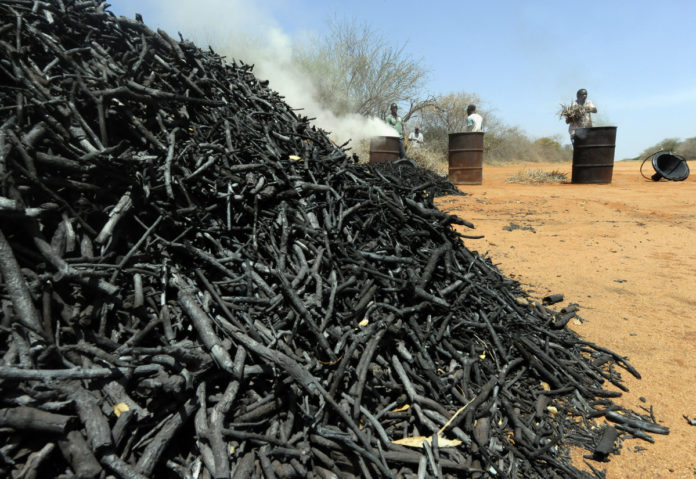Of all the wood produced every year in sub-Saharan Africa, 90% is used as fuel, posing a major sustainability challenge. Woodfuel, primarily firewood and charcoal, is the main source of energy for cooking for two-thirds of households and is a critical element in maintaining food security.
Millions of households depend on woodfuel production to make a living, but heavy reliance on it makes for social, economic, environmental and health concerns. With such complex issues, a broader approach is needed.
The Food and Agriculture Organization of the United Nations (FAO) is supporting an international conference that starts today and brings together woodfuel producers, forest managers, forest and energy decision makers, environmentalists, technological innovators, scientists and academics, policy makers, civil society and government institutions in Kumasi and online. Together, they will take stock of the challenges and learn from one another to move the sector forward towards sustainability, without compromising livelihoods which are reliant on it.
Woodfuel challenge is urgent as population and use rising
“It’s an urgent issue as the level of woodfuel use is already so high and with the population in sub-Saharan Africa growing and becoming increasingly urbanised, the demand for woodfuel will rise further, with serious environmental consequences,” said FAO Assistant Director-General and Regional Representative for Africa, Abebe Haile-Gabriel. “We need the collective involvement of all stakeholders and to engage on innovative solutions to making the production and trade of woodfuel sustainable.”
Based on current trends and progress towards SDG 7 – Affordable and Clean Energy – by 2030 there will still be more than 2 billion people, mainly living in Africa, relying on traditional biomass for cooking.
The conference, Sustainable Woodfuel Value Chains in Africa: Governance, Social, Economic and Ecological Dimensions, will raise awareness of the consequences of current practices with woodfuel production and consumption, as well as possible pathways towards sustainable forest management and restoration in support of green energy transition.
Informality and governance discussions
The informal nature of the production and trade of woodfuel is amongst the key issues attendees at the 3-day conference will pay attention to. There are ongoing efforts in some sub-Saharan African countries to organise, regulate and control the industry, including some places making it illegal despite opposition from producers who may have no other source of income. In some rural areas of sub-Saharan Africa such as in Kenya, as many as 60% of people are employed in charcoal production with few alternative employment options.
Grassroots groups give voices to forest users
The success of producer groups to find sustainable solutions to charcoal production will be featured at the conference. “Producers highlight the misconception that woodfuel use always leads to environmental degradation,” said FAO Senior Forestry Officer and one of the event organisers Nora Berrahmouni. “Instead, they will explain that by coming together as cooperatives, woodfuel producers have been able to train in more sustainable wood extraction – cutting a branch rather than the entire tree to allow for regrowth – or by using improved charcoal kilns. Producer cooperatives have also set up tree nurseries for native species and educated themselves about managing invasive ones,” she said.
In Zambia, producers were encouraged to collaborate by the Forest and Farm Facility (FFF) and formed the Zambia National Forest Commodities Association (ZNFCA). Because they are organised, they can collectively manage their tree resources and their certified sustainable charcoal is clearly recognisable by its ‘green’ label in the supermarket.
Nkumbwa Mark Kahyata is the Vice Chairperson of the Choma Charcoal Association, where he and his wife Charity Mufwimpizi have produced charcoal for the last decade in the Masuku area. When they saw that the supply of trees was reducing rapidly, they decided to stop cutting and educated themselves in taking only selected branches rather than whole trees. They also now use an improved kiln which makes the production of charcoal more sustainable.
“Belonging to the Association is a great benefit because it has reduced the stigma of being charcoal producers and we are now recognized by our traditional leaders,” he said. The producers’ group that Nkumbwa and Charity belong to has also set up its own nursery with thriving seedlings for restoring the forest.
FFF is active in 12 countries in Africa and other regions and is a partnership between FAO, the International Institute for Environment and Development (IIED), the International Union for Conservation of Nature (IUCN) and AgriCord.
Partners and frameworks
The conference, Sustainable Woodfuel Value Chains in Africa: Governance, Social, Economic and Ecological Dimensions (23-25 November), aims to bring together participants with a broad range of backgrounds and perspectives to promote understanding and sharing of knowledge, best practices and solutions to contribute to the implementation of Pan-African initiatives and frameworks such as the African Union Sustainable Forest Management Framework for Africa (2020-2030) and the African Forest Landscape Restoration Initiative (AFR100).
It is also a response to the recommendation of the African Forestry and Wildlife Commission’s call for the compilation, analysis, and dissemination of good practices for sustainable charcoal production and the adoption of alternative sources of energy.
The consortium of organising partners includes the Centre for International Forestry Research (CIFOR), World Agroforestry (ICRAF), Kwame Nkrumah University of Science and Technology (KNUST), University of Copenhagen, the International Union of Forestry Research Organizations (IUFRO), African Forest Policies & Politics (AFORPOLIS), Tropenbos Ghana, and FAO. The conference is supported by the Government of Ghana, through the Ministry of Land and Natural Resources, the Ghana Forestry Commission, the Environmental Protection Agency and the Ghana Energy Commission.
It is being hosted at the KNUST Business School in Kumasi, Ghana, in both English and French, and online.








